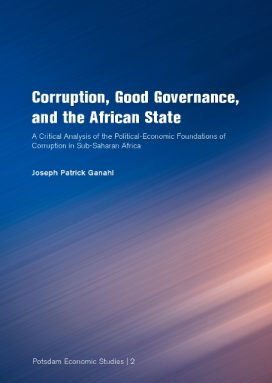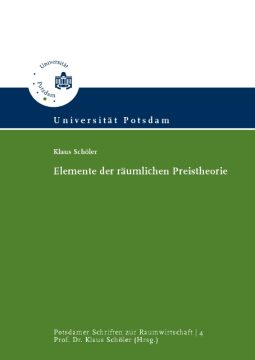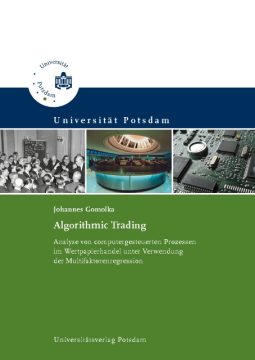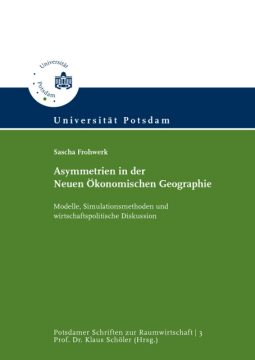African states are often called corrupt, indicating that the political system in Africa differs from the one prevalent in economically advanced democracies. This, however, does not give us any insight into what makes corruption the dominant norm of African statehood. Thus we must turn to the overly neglected theoretical work on the political economy of Africa in order to determine how the poverty of governance in Africa is firmly anchored both in Africa’s domestic socioeconomic reality, as well as in the region’s role in the international economic order. Instead of focusing on increased monitoring, enforcement and formal democratic procedures, this book combines economic analysis with political theory in order to arrive at a better understanding of the political-economic roots of corruption in Sub-Saharan Africa.
A Critical Analysis of the Political-Economic Foundations of Corruption in Sub-Saharan Africa
ISBN: 978-3-86956-248-3
310 pages
Release year 2014
Series: Potsdam Economic Studies , 2
16,00 €
Non-taxable transaction according to § 1 (1) UStG/VAT Act in combination with § 2 (3) UStG/VAT Act a. F. Providing this service, the University of Potsdam does not constitute a Betrieb gewerblicher Art/Commercial Institution according to § 1 (1) No. 6 or § 4 KStG/Corporate Tax Act. If the legal characterization of our business is changed to a commercial institution subsequently, we reserve the right to invoice VAT additionally. zzgl. Versandkosten
African states are often called corrupt, indicating that the political system in Africa differs from the one prevalent in economically advanced democracies. This, however, does not give us any insight into what makes corruption the dominant norm of African statehood. Thus we must turn to the overly neglected theoretical work on the political economy of Africa in order to determine how the poverty of governance in Africa is firmly anchored both in Africa’s domestic socioeconomic reality, as well as in the region’s role in the international economic order. Instead of focusing on increased monitoring, enforcement and formal democratic procedures, this book combines economic analysis with political theory in order to arrive at a better understanding of the political-economic roots of corruption in Sub-Saharan Africa.
Recommended Books
-
 2013
2013Elemente der räumlichen Preistheorie
8,00 €Non-taxable transaction according to § 1 (1) UStG/VAT Act in combination with § 2 (3) UStG/VAT Act a. F. Providing this service, the University of Potsdam does not constitute a Betrieb gewerblicher Art/Commercial Institution according to § 1 (1) No. 6 or § 4 KStG/Corporate Tax Act. If the legal characterization of our business is changed to a commercial institution subsequently, we reserve the right to invoice VAT additionally.
zzgl. Versandkosten
Add to cart -
 2011
2011Algorithmic Trading
32,00 €Non-taxable transaction according to § 1 (1) UStG/VAT Act in combination with § 2 (3) UStG/VAT Act a. F. Providing this service, the University of Potsdam does not constitute a Betrieb gewerblicher Art/Commercial Institution according to § 1 (1) No. 6 or § 4 KStG/Corporate Tax Act. If the legal characterization of our business is changed to a commercial institution subsequently, we reserve the right to invoice VAT additionally.
zzgl. Versandkosten
Add to cart -
 2011
2011Asymmetrien in der Neuen Ökonomischen Geographie
15,00 €Non-taxable transaction according to § 1 (1) UStG/VAT Act in combination with § 2 (3) UStG/VAT Act a. F. Providing this service, the University of Potsdam does not constitute a Betrieb gewerblicher Art/Commercial Institution according to § 1 (1) No. 6 or § 4 KStG/Corporate Tax Act. If the legal characterization of our business is changed to a commercial institution subsequently, we reserve the right to invoice VAT additionally.
zzgl. Versandkosten
Add to cart -
 2015
2015Water Management Policies and their impact on irrigated crop production in the Murray-Darling Basin, Australia
28,50 €Non-taxable transaction according to § 1 (1) UStG/VAT Act in combination with § 2 (3) UStG/VAT Act a. F. Providing this service, the University of Potsdam does not constitute a Betrieb gewerblicher Art/Commercial Institution according to § 1 (1) No. 6 or § 4 KStG/Corporate Tax Act. If the legal characterization of our business is changed to a commercial institution subsequently, we reserve the right to invoice VAT additionally.
zzgl. Versandkosten
Add to cart
Publisher Info
Contact
Potsdam University Library
University Press
Am Neuen Palais 10
14476 Potsdam
Germany
verlag@uni-potsdam.de
0331 977-2094
0331 977-2292





